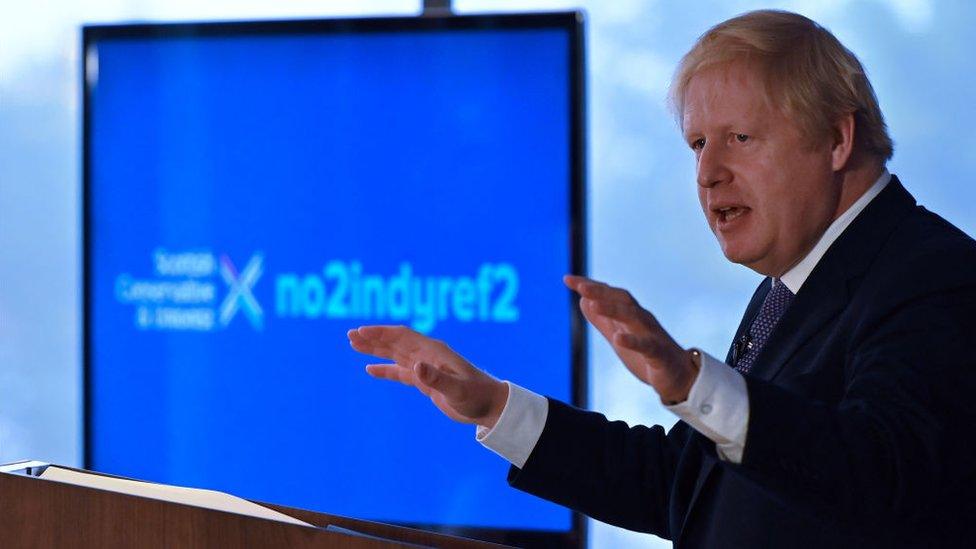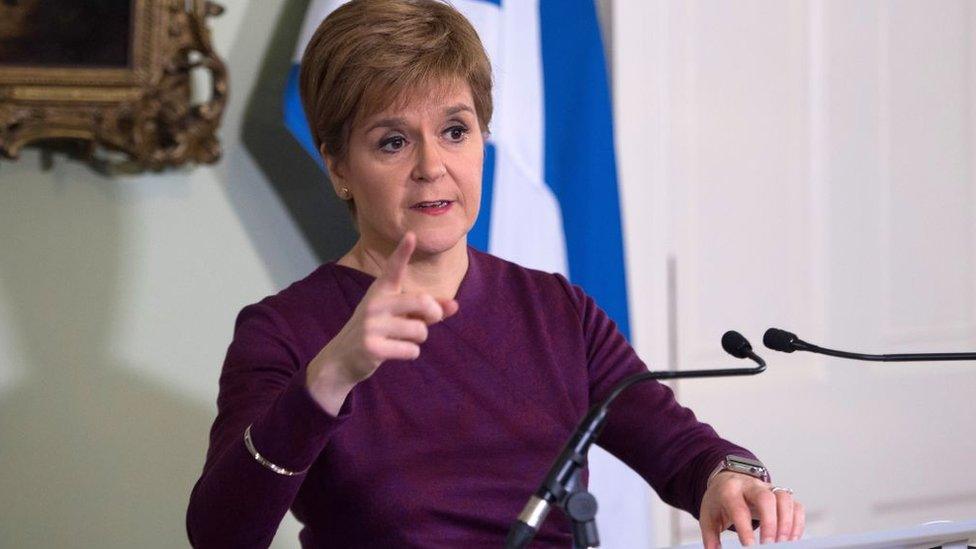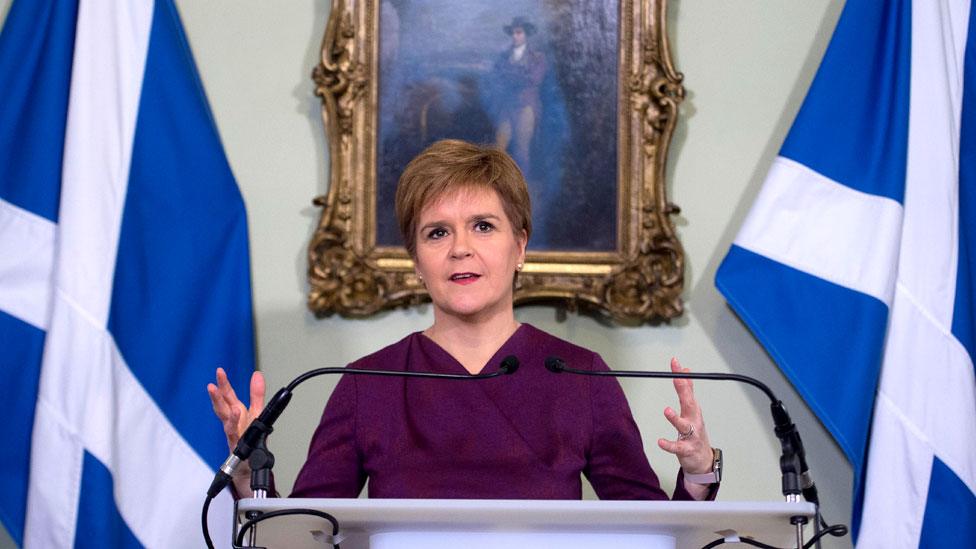PM's indyref2 rebuffal is not subtle, but it is predictable
- Published

Boris Johnson wasted little time in giving his response to the indyref2 demand
And so we have the response from the prime minister anent the demand for a further referendum on Scottish independence.
Is it a detailed policy paper, filled with analysis, a lengthy back-story and a prolonged preamble? Is it a philosophical analysis of the concepts of independence and Union?
Friends, it is not. However, to be clear, that is entirely understandable from the perspective of the UK government.
They do not favour independence. They want nothing to do with indyref2. Thus, they have wasted minimal time, thought and wording in delivering their response to Nicola Sturgeon's demand.
Quite simply, the Prime Minister argues in his letter to the FM that the matter was settled by the referendum of 2014, when the people of Scotland voted to remain in the UK.
During that contest, he recalls, both Ms Sturgeon and her predecessor as first minister argued that the decision placed before the people was a "once in a generation" choice.
In a single page letter, there is no more subtlety than that. Yes, the letter goes on to urge UK unity to "unleash the potential of this great country".
'Get over it'
But the argument itself does not go much beyond: "you lost, get over it". Allied to that reminder re the pledges of accepting the outcome set out in the Edinburgh Agreement.
Again, to be clear, that is not remotely surprising. The prime minister knows that is the only solid, secure ground upon which to found his constitutional policy.
If he advances into territory connected to the subsequent Brexit decision, then he enters a quagmire for Unionists. Hence, the simplicity and bluntness of the response.

Nicola Sturgeon says Mr Johnson's strategy is "doomed to failure"
In response, Nicola Sturgeon is, equally, unsurprised. Indeed, she says she anticipated this very response. Not, in truth, a tricky exercise. The clues were fairly liberally scattered.
But her response is intriguing. Yes, there is condemnation of the letter from the PM, which she says shows "utter contempt for the votes, views and interests of the people of Scotland".
It is a strategy, she says, which is "doomed to failure". But there is no particular sense of urgency about the FM's response, albeit it is couched in relatively apocalyptic language.
Ms Sturgeon says the PM's response will not prevail. But her analysis fits comfortably with a medium to long-term strategy, rather than pursuing any notion of emergency.
Does she declare UDI? Not for a second. Does she propose to withdraw her MPs from Westminster? No. OK, so you might say these are relatively far-fetched concepts in contemporary Scotland, but they are theoretical responses which have, in the past, been pursued in other polities.
More precisely, does she set out plans to hold a referendum anyway, regardless of the refusal by the PM to transfer the necessary power to Holyrood under a Section 30 Order?
'Anti-democratic'
She does not, believing - with a considerable degree of sense - that such a manoeuvre would be boycotted by Union-supporting parties and would thus fail to attract any global endorsement. It would, in short, be a gesture, not a solution.
Rather, she talks about her practical response in terms of an iterative approach. Formal rejection of the PM's stance. Followed by a detailed rebuttal later this month.
Followed by a further vote at Holyrood, to win wider support for her position. (The Greens have already condemned the PM's letter as "utterly appalling" and anti-democratic.)
Followed by a prolonged campaign. Followed, if nothing changes, by the 2021 Holyrood elections in which the issue can be expected to polarise the contest between the largest party supporting independence, the SNP, and the largest party supporting the Union, the Conservatives.
Two elements underlie today's exchange. Firstly, raw, gut politics. A power struggle between Nationalists and Unionists, an attempt to prevail via appeals to popular support.

Nationalists and Unionists came face to face during a pro-independence march at the weekend
But, secondly, there is the issue of competing mandates. Tory Union supporters, of course, cite a UK mandate in all circumstances, while attempting to argue that Scotland's interests can be protected.
They say that Scotland voted in 2014 to remain in the UK; that the decision taken then was intended to be generational.
As a consequence, they won't listen to arguments that things changed with the Brexit vote. They say Scotland must go along with the UK decision to leave the EU - because Scotland voted to remain in the UK.
Again, there is nothing subtle about this. It is a combination of power politics and arithmetic.
But Nationalists, of course, cannot accept that blend. They adduce a Scottish mandate in all circumstances. They say that the 2014 vote is overtaken and must be rerun because the terms placed before the people then have changed.
Material change
And, what is more, they have changed through a decision rejected by the people of Scotland, who opposed Brexit by a substantial majority.
Again to be clear, the SNP anticipated this caveat to the 2014 result. They said in their 2016 manifesto that they reserved the right to revisit the outcome in the event of a material change in circumstances. As example, they cited the UK leaving the EU against the will of the Scottish people.
Supporters of independence say that means a referendum will happen, sooner or later. The current position will not prevail.
Supporters of the Union see things differently. They say Scotland voted to remain in the UK - and must now abide by the rules (and political decisions) of that Union. Each side accuses the other of dogmatism.
However, it is that mandate argument which lies behind the closing argument of the PM in his letter that the focus now must be upon UK politics, UK endeavour.
It is that same mandate argument which is rejected - which could never be accepted - by the FM.
- Published14 January 2020

